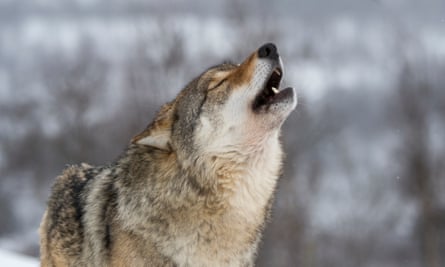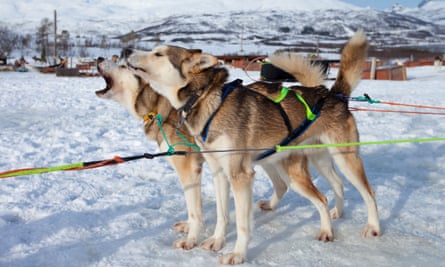
Name: Wolf howls.
Age: Aaarooooooooh.
Excuse me? Aaarooooooooh.
Yeah, but what is that, exactly? A wolf howl, obviously.
OK, but why? Because that’s what we’re talking about. Have you got one?
A wolf? Obviously not. I do have a couple of dogs, which I realise are descended … What breed?
Of dog? Shih-tzu – no childish giggling, please. Aaarooooooooh.
Here we go again! They’re not wolves, OK? You might need to rethink that. Scientists have found that some breeds are more wolflike than others.
I can see that, but my shih-tzus are little, fluffy and seriously un-lupine. You’d be surprised. It’s about what happens when you play the sound of a howling wolf pack to your dog. Researchers found that some more ancient breeds are more likely to respond in kind.
Pah! Who are these so-called scientists? The experiment stemmed from an observation by Fanni Lehoczki, a researcher at Eötvös Loránd University in Hungary. She noticed that her dog – a husky, as it happens – howled in the company of other dogs, and they barked back. It got her thinking.
About? Howling allows wolves to convey important information: it could be a greeting, used to track other pack members or to send a warning to strangers stepping into their territory. But Lehoczki was interested in seeing to what extent domestication severed the links between dogs and their wolf ancestors.
What did Lehoczki and her team of researchers do? They took 68 pedigree breeds, played them the sound of howling wolves and watched how they responded.
And? There was a clear difference according to breed. Some Asian breeds, which are more ancient and believed to have been interbred with actual wolves at times, are more likely to howl back, longer and harder, while more modern western breeds will probably just bark.

So next door’s cockapoo … Is not a pedigree. To be honest, a cockapoo is more likely to respond by eating a big bar of chocolate, then having to go to the vet, which will cost £2,000.
OK, the Frenchie on the other side? A French bulldog is more likely to bark, being much further away genetically than a husky or a samoyed.
And my shih-tzu? Is apparently more wolflike than you’d initially suspect.
Now you come to mention it, they do go a bit crazy at a full moon. At least you can empathise with them more now. As Lehoczki says: “Maybe this can help owners to realise that this behaviour, which can be a challenge, is a natural behaviour of the breed.”
Do say: “Come on guys, up you get on the sofa. It’s your new favourite: Yellowstone with Kevin Costner.”
Don’t say: “Come on guys, we’re off to the deer park to have some fun. Don’t forget, work together …”



